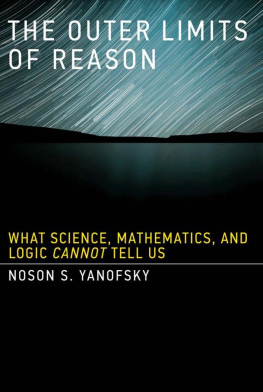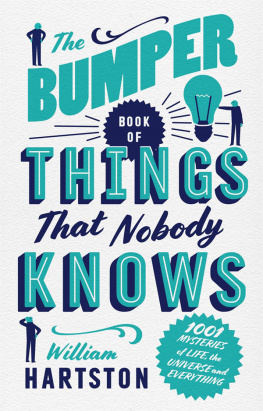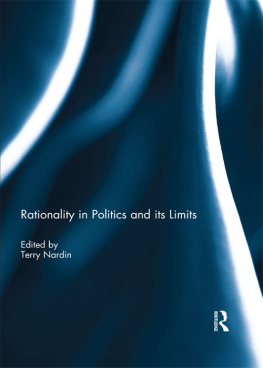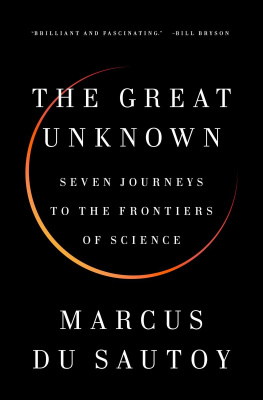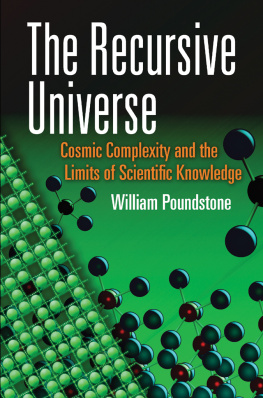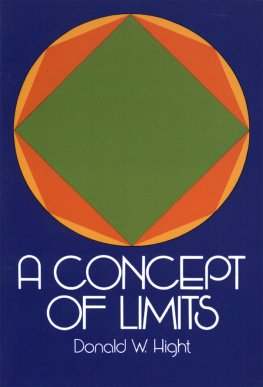Noson S. Yanofsky - The outer limits of reason: what science, mathematics, and logic cannot tell us
Here you can read online Noson S. Yanofsky - The outer limits of reason: what science, mathematics, and logic cannot tell us full text of the book (entire story) in english for free. Download pdf and epub, get meaning, cover and reviews about this ebook. year: 2016, publisher: The MIT Press, genre: Children. Description of the work, (preface) as well as reviews are available. Best literature library LitArk.com created for fans of good reading and offers a wide selection of genres:
Romance novel
Science fiction
Adventure
Detective
Science
History
Home and family
Prose
Art
Politics
Computer
Non-fiction
Religion
Business
Children
Humor
Choose a favorite category and find really read worthwhile books. Enjoy immersion in the world of imagination, feel the emotions of the characters or learn something new for yourself, make an fascinating discovery.
- Book:The outer limits of reason: what science, mathematics, and logic cannot tell us
- Author:
- Publisher:The MIT Press
- Genre:
- Year:2016
- Rating:5 / 5
- Favourites:Add to favourites
- Your mark:
- 100
- 1
- 2
- 3
- 4
- 5
The outer limits of reason: what science, mathematics, and logic cannot tell us: summary, description and annotation
We offer to read an annotation, description, summary or preface (depends on what the author of the book "The outer limits of reason: what science, mathematics, and logic cannot tell us" wrote himself). If you haven't found the necessary information about the book — write in the comments, we will try to find it.
An exploration of the scientific limits of knowledge that challenges our deep-seated beliefs about our universe, our rationality, and ourselves.
Noson S. Yanofsky: author's other books
Who wrote The outer limits of reason: what science, mathematics, and logic cannot tell us? Find out the surname, the name of the author of the book and a list of all author's works by series.
The outer limits of reason: what science, mathematics, and logic cannot tell us — read online for free the complete book (whole text) full work
Below is the text of the book, divided by pages. System saving the place of the last page read, allows you to conveniently read the book "The outer limits of reason: what science, mathematics, and logic cannot tell us" online for free, without having to search again every time where you left off. Put a bookmark, and you can go to the page where you finished reading at any time.
Font size:
Interval:
Bookmark:
The Outer Limits of Reason
The Outer Limits of Reason
What Science, Mathematics, and Logic Cannot Tell Us
Noson S. Yanofsky
The MIT Press
Cambridge, Massachusetts
London, England
2013 Massachusetts Institute of Technology
All rights reserved. No part of this book may be reproduced in any form by any electronic or mechanical means (including photocopying, recording, or information storage and retrieval) without permission in writing from the publisher.
MIT Press books may be purchased at special quantity discounts for business or sales promotional use. For information, please email or write to Special Sales Department, The MIT Press, 55 Hayward Street, Cambridge, MA 02142.
Library of Congress Cataloging-in-Publication Data
Yanofsky, Noson S., 1967
The outer limits of reason : what science, mathematics, and logic cannot tell us / Noson S. Yanofsky.
pages cm
Includes bibliographical references and index.
ISBN 978-0-262-01935-4 (hardcover : alk. paper)
1. Knowledge, Theory of. 2. SciencePhilosophy. 3. MathematicsPhilosophy. I. Title.
Q175.32.K45Y36 2013
001.01dc23
2012050531
10 9 8 7 6 5 4 3 2 1
Please email all comments and criticisms to .
For
Shayna Leah,
Hadassah, and Rivka
Table of Contents
Preface
The more we learn about the world, and the deeper our learning, the more conscious, specific, and articulate will be our knowledge of what we do not know, our knowledge of our ignorance. Karl Popper A mans got to know his limitations. Harry Callahan, Magnum Force (1973) Everything should be made as simple as possible, but not simpler. Attributed to Albert EinsteinWith understanding comes ambivalence. Once we know something, we often find it boring and trite. On the other hand, the mysterious and unknown fascinates us and holds our attention. That which we do not know or understand is what interests us, and what we cannot know intrigues us even more. This book explores topics that reason tells us we cannot know because they are beyond reason.
Many books convey the amazing facts that science, mathematics, and reason have revealed to us. There are also books that cover topics that science, mathematics, and reason have not yet fully explained. This book is a little different. Here we study what science, mathematics, and reason tell us cannot be revealed. What cannot be predicted or known? What will never be understood? What are the limitations of computers, physics, logic, and our thought processes? What is beyond the bounds of reason? This book aims to answer some of these questions and is full of ideas that challenge our deep-seated beliefs about the universe, our rationality, and ourselves.
Along the way we will study simple computer problems that would take trillions of centuries to solve; consider perfectly formed English sentences that have no meaning; learn about different levels of infinity; leap into the bizarre and wonderful world of the quantum; discuss specific problems that computers can never solve; befriend butterflies that bring about blizzards; ponder particles that simultaneously dance at different parties; hear about paradoxes and self-referential paradoxes; see what relativity theory tells us about our naive notions of space, time, and causality; understand Gdels famous theorems about the limitations of logic; discover certain problems in mathematics and physics that are impossible to solve; explore the very nature of science, mathematics, and reason; wonder why the universe seems perfect for human beings; and examine the complex relationship between our mind, reason, and the physical universe. We will also attempt to peek beyond the borders of reason and see what, if anything, is out there. These and many other fascinating topics will be presented in a way that is clear and comprehensible.
While exploring these various limitations in diverse areas, we will see that many of the limitations have a similar pattern. These patterns will be investigated in order to better understand the structure of reason and its limits.
This book is not a compendium of all the diverse examples in which limitations of reason are found. Rather, our goal is to understand why these boundaries arise and why reason cannot extend beyond them. Several representative limitations in each area are selected and discussed in depth.
Rather than just listing the limitations, I aim to explain them or at least provide the intuition of why a particular area is beyond reason. It is important to realize that this book is not meant to be speculative or to have a New Age orientation. Nor is it a history book in which I gloss over the meaning of ideas in order to focus on their chronological development. This is a popular science book that will gradually and clearly explain the ideas presented.
Since I accept Stephen Hawkings dictum that every equation halves the number of readers, very few equations are found in this book. However, I do believe in the power of diagrams, charts, and graphs to simplify complex ideas. My goal is clarity.
Each chapter deals with a different area: science, mathematics, language, philosophy, and so on. These chapters are arranged from concrete to abstract. I start with simple problems of everyday language and move on to straightforward philosophical questions, ending with the abstract world of mathematics. For the most part, the chapters are independent of each other and can be read in any order. Readers are encouraged to begin with topics that most interest them. (The unifying theme of self-referential paradoxes is found in chapters .)
Acknowledgments
In a sense, this book is a collaborative effort with my friends and colleagues in the Computer and Information Science Department at Brooklyn College. They have read the chapters, corrected my mistakes, chided me when I was being silly, and encouraged me when I was stuck. They have given me the warm intellectual environment that made this book possible. I thank them!
Many Brooklyn College faculty members were kind enough to read and comment on several of these chapters: Jonathan Adler, David Arnow, George Brinton, Samir Chopra, Jill Cirasella, Dayton Clark, Eva Cogan, Jim Cox, Scott Dexter, Keith Harrow, Danny Kopec, Yedidyah Langsam, Matthew Moore, Rohit Parikh, Simon Parsons, Michael Sobel, Aaron Tenenbaum, and Paula Whitlock. Their comments have made this a far better book.
Some chapters were used in a course given at Brooklyn College. Great benefit was derived from student participation and the give-and-take of a classroom dialog. I thank the students for listening, arguing, helping, and correcting. Many students at Brooklyn College and the Graduate Center of the City University of New York read and commented on earlier drafts: Firat Atagn, Can Bakent, Hubert Bennett, Greg Benson, Be Birchall, Raila C. Brejt, Fatemeh Choopani, Simon Dexter, Aline Elmann, Madelene Feingold, Terri Grosso, Miriam Gutherc, Jay Jankelewicz, Matthew P. Johnson, Joel Kammet, Tatiana Kedel, Wai Khoo, Karen Kletter, Erdal Kse, Michael Lampis, Shalva Landy, Holly Lo Voi, Jon Lo Voi, Matthew Meyer, Valia Mitsou, Jordi Navarrette, Shoshana Neuburger, Hadassah Norowitz, Nicole Reilly, Artur Sahakyan, Connor Savage, Angela Shatashwili, Alex Sverdlov, Stanislav Turzhavskiy, Fredda Weinberg, and Karol Wysocki. I am indebted to them all.
Numerous other people looked over parts of the book and have been helpful: Ros Abramsky, Samson Abramsky, Marcia Barr, Michael Barr, Rebecca Barr, Adam Brandenburger, Richard Churchill, Melvin Fitting, Leopold Flatto, Robert J. Fogelin, Chaim Goodman-Strauss, Ariel Halpert, Eliyahu Hershfeld, Ellen Hershfeld, Faigy Hershfeld, Pinchas Hershfeld, Shai Hershfeld, Yitzchok Hershfeld, Michael Hicks, Joshua Honigwachs, Roman Kossak, Klaas Landsman, Andr Lebel, Raphael Magarik, Camille Martin, Jolly Mathen, Rochel Moskowitz, Larry Moss, Naftoli Neuburger, Janos Pach, Carol Parikh, Suri Raber, N. Raja, Barbara Rifkind, Andrei Rodin, Ariel Ropek, Evan J. Siegel, Michael Vitz, Sharon Yanofsky, and Mark Zelcer. Their criticism, comments, and helpful ideas are deeply appreciated.
Next pageFont size:
Interval:
Bookmark:
Similar books «The outer limits of reason: what science, mathematics, and logic cannot tell us»
Look at similar books to The outer limits of reason: what science, mathematics, and logic cannot tell us. We have selected literature similar in name and meaning in the hope of providing readers with more options to find new, interesting, not yet read works.
Discussion, reviews of the book The outer limits of reason: what science, mathematics, and logic cannot tell us and just readers' own opinions. Leave your comments, write what you think about the work, its meaning or the main characters. Specify what exactly you liked and what you didn't like, and why you think so.

